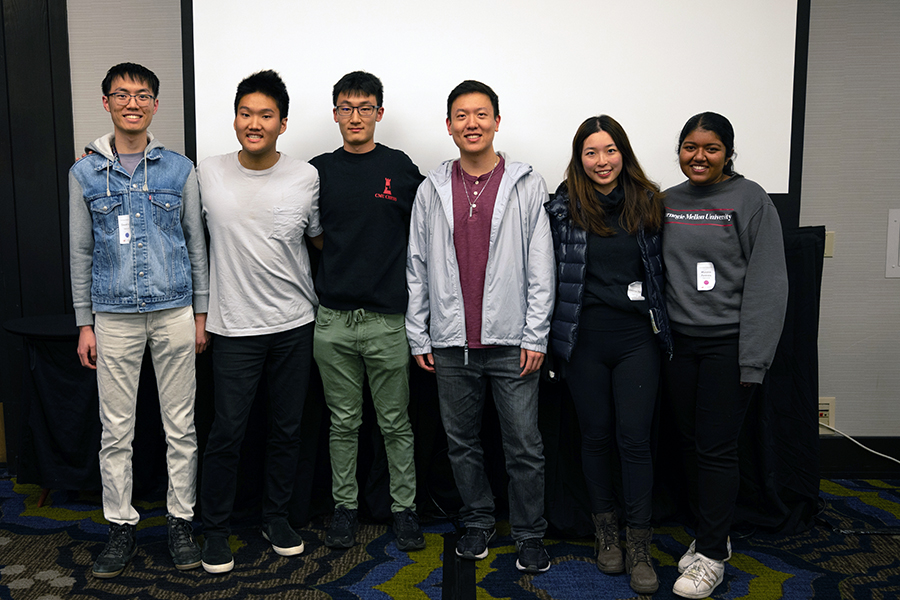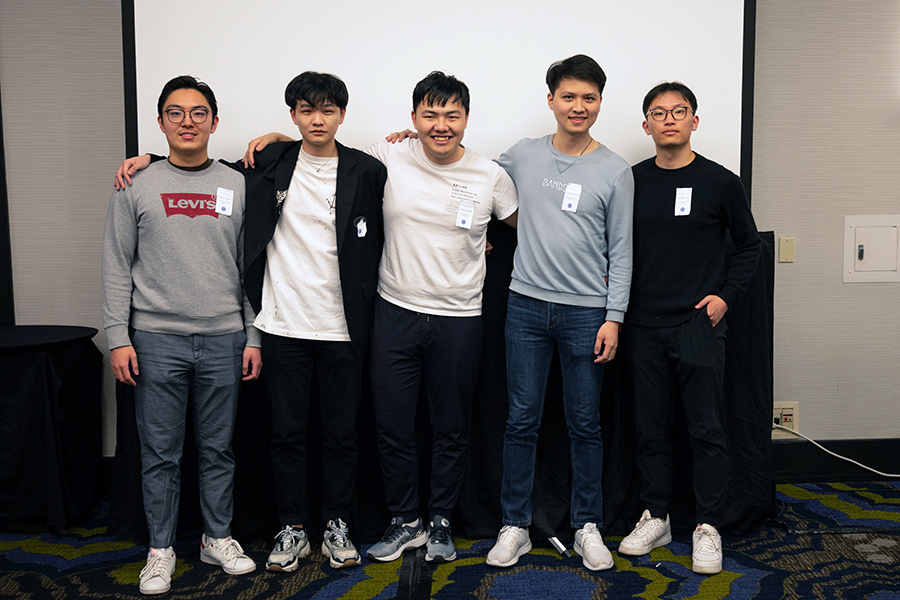Students trade during the Market Making Game.
Market Making Game Participants Trade Winning Strategies
By Kirsten Heuring
In the heyday of floor trading at the New York Stock Exchange, controlled chaos reigned. Traders would shout orders and network with each other to work on getting the best deals to buy and sell stocks.
While most trades are now done electronically, soft skills such as communication are still important in the finance industry. Carnegie Mellon University students learned how to apply their soft and quantitative skills at the Market Making Game. Hosted by the Quant Club and sponsored by Optiver, a trading firm and market maker for various financial instruments, this year’s contest took place March 18.
“The Market Making Game, compared to our other signature event Quantathon in February, is designed to be more interactive,” said Amy Xiao, mathematical sciences junior and president of the Quant Club. “To win the game, you not only need solid math skills or estimation tricks to find out the real value of contracts, but also interpersonal communication skills and psychology or game theory ideas to find a match for your trade.”
Over four rounds, students in teams of five or six receive various contracts for which they have 10 minutes to determine the value of based on various clues in the problems and from the Quant Club leadership. They then have 20 minutes to trade with other teams. During this year’s event, students dashed around a Wyndham ballroom racing to different teams to lock in the best trading deals.
The problems were designed by William Hrusa, professor of mathematical sciences and advisor to the Quant Club; and Gan Yang, a senior in mathematical sciences and former president of the Quant Club.
“I used my course work and interview questions I was asked as a basis,” Yang said. “I tried to find things relevant to the industry, so students can apply these problems to future work in the industry.”
As part of the game, students interacted with Optiver representatives, trading with them during rounds and getting advice.
Aashir Master, a 2018 mathematical sciences alumnus and a software engineer at Optiver, said he was happy to return to his alma mater. He said mathematics and computer science have been foundational for his career.
“The CMU curriculum encourages curiosity, which is a valuable trait to have in the industry,” Master said. “It’s really cool to see CMU students having fun with this game.”
Other Optiver employees who assisted with the event last year came back. Randall Laurence, who trains Optiver traders, and Patricia Dull, a quantitative trader, both said they were enthusiastic to return to this event.
“I really enjoyed the Market Making Game last year, and it has a lot of parallels to the real world,” Laurence said. “This is one of the most well-run events I’ve seen on any college campus.”
Approximately 150 graduate and undergraduate students participated in this year’s Market Making Game.
“There is no place else in the world where undergrads can get this opportunity,” Hrusa said. “At the end of the day, I just want all the kids to have fun.”
Also among the competitors were students were from Carnegie Mellon’s Master of Science in Computational Finance (MSCF) program. The MSCF program is a three-semester interdisciplinary collaboration between the Department of Statistics & Data Science in the Dietrich College of Humanities and Social Sciences, the Heinz College of Information Systems and Public Policy, the Department of Mathematical Sciences in the Mellon College of Science and the Tepper School of Business.
“The Market Making Game closely simulated trading of financial products in actual markets,” said Jiajun (Victor) Yuan, an MSCF student and a member of the team Unsung Heroes of MSCF. “It took a combination of technical expertise, creative strategy formulation, teamwork and proficient execution in order to excel.”
Teams could win in two categories, for trading and for estimation skills in how close they were to the value of contracts.
In trading, Silicon Valley Bank placed first, Team w was second and bonobos took third. For estimation, Unsung Heroes of MSCF placed first place, Silicon Valley Bank was second and nmm took third. The teams earned Optiver merchandise, and the Optiver representatives celebrated with the top two teams in each category over dinner.
“I really enjoyed this event,” said Erica Wang, a junior in mathematical sciences and computer science and a member of team Silicon Valley Bank. “I was a market maker during the game, and I constantly adjusted our quote based on newly released information, changes in the market, our confidence level on the estimation, liquidity, risk, etc. I learned a lot about finding a balance between these parameters, but it is very complicated. I am looking forward to learning more next year!”

Team w from left to right: David Wu, Eric Oh, Jonathan Liu, John Wang, Christina Yao and Mahima Pannala

Unsung Heroes of MSCF from left to right: Jiajun Yuan, Boyu Fang, Jiayuan Ma, Jingyun Yang and Qiang Chen
Not pictured, Heyu Zhang
Team Silicon Valley Bank from left to right: Ricky Huang, Wendy Li, Fenglin Wang, Richard Zhan, Ying Sun and Erica Wang